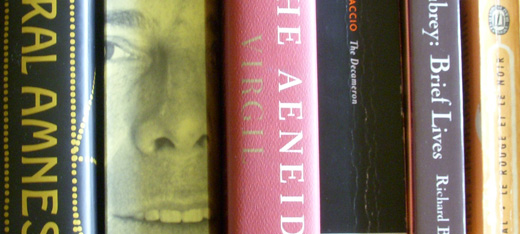Friday
Morning Read
¶ In the Decameron VIII, ii, a priest tricks a married woman more or less as the German soldier did in the last story — with the judicious use of witnesses, obliging the tricked party to return property. As the trickster is a priest, however, the accent is anticlerical and the jokes tinged with blasphemy. When the padre beds the wife, for example, he makes her “a kinswoman of the Lord God.”
¶ Much to my own surprise, I was so gripped with the exploits of Arcadian Pallas that I went ahead and read a second hundred lines, right through to his death. Hercules’ “lament”:
stat sua cuique dies, breve et inreparabile tempus
omnibus est vitae; sed famam extendere factis,
hoc virtutis opus…
¶ In Aubrey: Fleetwood, Foster, Florio, Fuller, Gascoigne, Graunt, Gellibrand, and Gill. Impenetralia from the last of these, about a schoolmaster fond of whipping:
This Dr Gill whipped Duncombe, who was not long after a colonel of dragoons at Edgehill-fight, taken pissing against the wall. He had his sword by his side, but the boys surprised him: somebody had thrown a stone in at the window; and they seized the first man they lighted on. I think his name was Sir John Duncombe (Sir John Denham told me the story), and he would have cut the doctor, but he never went abroad except to church, and then his army went with him. He complained to the council, but it became ridicule and his revenge sank.
Oh, well, you get the idea…
¶ From Merrill’s “River Poem”:
For although the old man, by the time we all went home,
Had moved away he stayed there wandering
Like a river-flower, thinking rivery things.
¶ In Le rouge et le noir, Julien goes to work on his very insincere seduction of the Maréchale de Fervaques. I have no idea what Stendhal is up to.
¶ Clive James on Raymond Aron: four pieces, all saying the same thing, but in a style quite at odds with the message. Aron’s tricky political positions, we’re told, are expressed in lucid, nuanced prose; but James seems to be stumbling through the terrain, defending his man from attacks that begin to seem chimerical. It were better to make the case for Aron before working so sweatily at dismantling the case against him. Lots of pot-shots at Sartre, of course, such as:
… Aron, unlike Sartre, had always been the kind of student who actually read the books…

